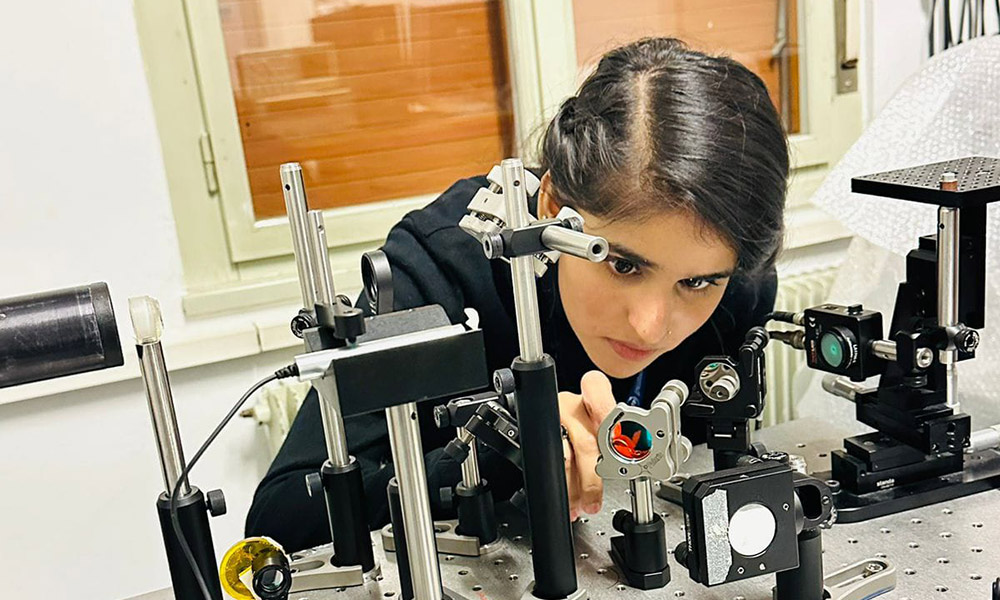
As part of his role within the Science, Technology and Innovation Unit and its Multidisciplinary Laboratory (Mlab) at the Trieste-based Abdus Salam International Centre for Theoretical Physics (ICTP), Post-Doctoral Fellow Humberto Cabrera Morales runs optics experiments, and, in conjunction with ICTP Emeritus Scientist Joe Niemela, supervises master’s and doctoral students from around the developing world. Then, encompassing a professional goal critical to the career trajectories of the young researchers, Cabrera Morales works with the students to publish their work in high-level academic journals.
The wide-ranging and far-reaching impact that this collaborative work has across the world, shines in its details: In 2024, Cabrera Morales led hands-on training of five students from Pakistan and Tunisia; organized eight major outreach and conference activities locally and abroad; collaborated with his students to publish 24 journal papers; and helped two of his students start their own labs in their home countries of Togo and Pakistan. “The students come here with energy, with good ideas, and we work hard together,” says Cabrera Morales. “We have been very successful because we combine our skills and our knowledge.”
The lab itself, a key element of the SPIE-ICTP Anchor Research Program in Optics, stems from a suggestion he made to current ICTP Emeritus Scientist Joe Niemela in 2011, when Cabrera Morales was a post-doctoral student in Venezuela as well as a regular participant at the ICTP’s Winter College. “Joe mentioned that SPIE was supporting an optics project here at the ICTP, a core research program in optics, but we didn’t have an on-campus laboratory,” says Cabrera Morales. “So I proposed to him to start an optics lab with low-cost devices, something I was already doing in Venezuela. I was publishing papers, I was training students, and I suggested to Joe that we could replicate this at the ICTP.”
The optics lab was established in 2014, partially with funds from SPIE, and the organization continues to contribute financial support towards Cabrera Morales’ staff position, with fellowships for developing country scientists mainly coming through ICTP programs. The official lab mission is to enable early-career scientists in their career-development paths, to provide advanced training to exceptional graduate students, and to serve the local community in outreach activities that can involve young researchers from developing countries as facilitators. It’s clear that Cabrera Morales is achieving this and more: during our online chat, his enthusiasm was infectious, and his obvious pride in his students’ achievements was inspiring.
Last year, for example, he worked with a visiting student, Isma Javed, the current president of the SPIE Student Chapter at Pakistan’s Information Technology University in Lahore. The lab had previously implemented various optical-spectroscopy and microscopy-detection systems for biosensing applications: “We primarily investigated photocatalytic degradation of pollutants in the environment; the separation and detection of biomolecules using electrophoresis and thermal lensing as a detection system; and also explored materials characterization using thermal-length spectroscopy and beam-deflection spectroscopy,” Cabrera Morales explains.
With Javed in the lab, work began on a digital holography microscopy for material characterization as well as metamaterials characterization. “Isma arrived with no prior hands-on experience in optical setups,” notes Cabrera Morales. “She had mainly been designing metamaterials and metasurfaces. Together, we decided to go ahead with a low-cost, 3D-printed inverted microscope based on a Fresnel Biprism, a fully automatic device. This is a novelty with applications in biology, because for biological samples you need to have an inverted microscope.” Javed, says Cabrera Morales, is a great example of the impact of the lab-related programs: in a year and a half, she gained experimental experience, enhanced her expertise in optics, developed an accessible, market-ready device, and published several journal articles relating to her work. She also taught at ICTP’s Winter College last year as well as at an ICTP-run program in Kenya, and helped to organize a major outreach activity in Trieste. In addition, she had the opportunity to work at Elettra Sincrotrone Trieste, a research center specializing in laser and materials science, that welcomes students from Cabrera Morales’ MLab. “These are all good things we can do,” he says. “And two of the most important things we can offer these students is giving them access to experimental setups and facilities that they don't have in their home countries, along with a professional scientific environment for them to work in.” Thanks to her time with MLab, Javed was able to complete the experimental aspect of her doctoral work at ICTP.
“You can see how happy the students are when they arrive here,” says Cabrera Morales, whose research focus includes optical interferometry, microscopy imaging, and photothermal and laser-based spectrometry among other areas. “This motivates me to do my best that I can for them, with them. And then” — best of all, really, in terms of the lab’s ongoing collaborative impact — “once they leave for their own labs or on to universities, we remain colleagues.”